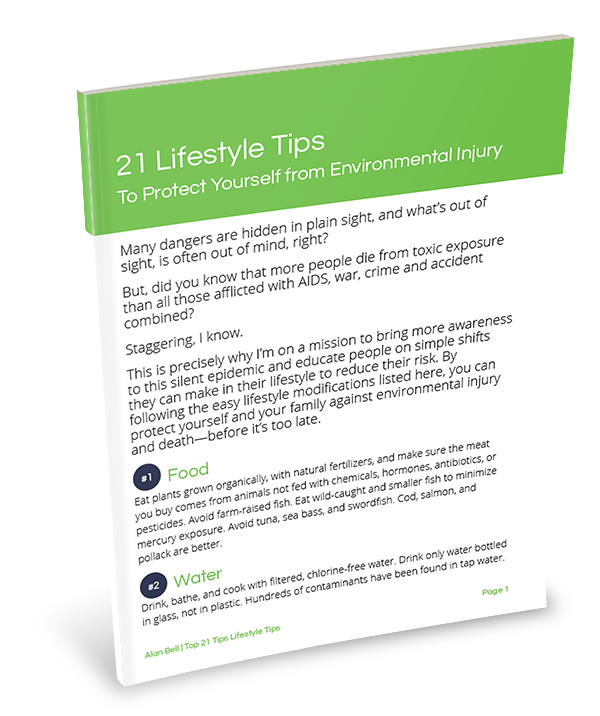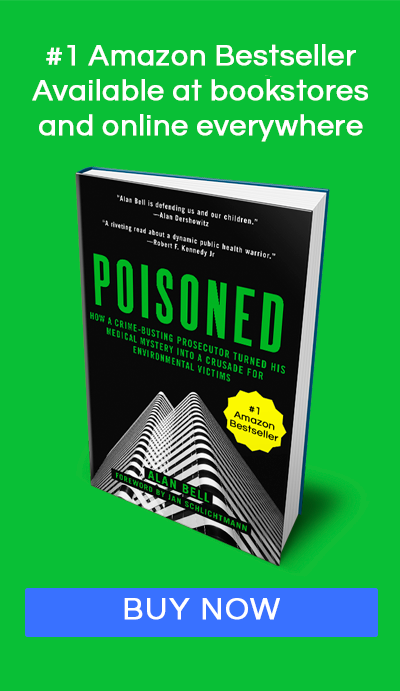It’s January. A time when most of us enter a state of reflection on what worked or didn’t work for us in 2016 and how we can improve areas of our life for the year ahead. Many of us will re-commit to consistent exercise, eating better, getting more sleep…and the list goes on. But how many of us are considering a healthier lifestyle based upon an awareness of environmental toxins that are surrounding us everywhere we turn?
Probably not many because these dangers are hidden in plain sight, and what’s out of sight, is often out of mind, right?
But, did you know that more people die from toxic exposure than all those afflicted with AIDS, war, crime and accident combined?
Staggering, I know.
This is precisely why I’m on a mission to bring more awareness to this silent epidemic and educate people on simple shifts they can make in their lifestyle to reduce their risk. By following the easy lifestyle modifications listed below, you can protect yourself and your family against environmental injury and death—before it’s too late.
Food. Eat plants grown organically, with natural fertilizers, and make sure the meat you buy comes from animals not fed with chemicals, hormones, antibiotics, or pesticides. Avoid farm-raised fish. Eat wild-caught and smaller fish to minimize mercury exposure. Avoid tuna, sea bass, and swordfish. Cod, salmon, and pollack are better.
Water. Drink, bathe, and cook with filtered, chlorine-free water. Drink only water bottled in glass, not in plastic. Hundreds of contaminants have been found in tap water.
Indoor air. We spend 90 percent of our time indoors, where pollutants are up to five times higher than outdoors, so use ozone-free HEPA air purifiers. When vacuuming, use a HEPA-filtered unit. If you’re building or renovating a home, consider installing a central vacuum cleaning system with a HEPA filter. Buy a test kit to determine if mold, radon, or asbestos are present in your home. Asbestos and radon are leading causes of lung cancer. Regularly open the windows in your house to let fresh air dilute any radon gas that has built up. Use tight sealing glass doors on your fireplace to minimize the fumes (carbon monoxide and nitrogen dioxide) that could seep into your home. Never use any type of scented air fresheners (unless they are natural essential oils) because they contain many synthetic toxic chemicals.
Personal care products. Most personal care products with synthetic fragrances contain toxic chemicals. Avoid perfume, cologne, and products with added fragrance. Use nontoxic sunscreen. Most sunscreens are chemical based and those should never be used. Buy sunscreens containing zinc oxide as their active ingredient. Read labels and avoid products that contain the following:
- Words ending in “paraben”
- DMDM hydantoin
- Imidazolidinyl urea
- Methylchloroisothiazolinone
- Triclosan
- Triclocarban
- Triethanolamine (TEA)
Children. Don’t buy disposable, plastic baby diapers. They contain toxic chemicals that infiltrate children’s bodies. Use cloth diapers. When using personal care products for children:
- Use fewer products and use them less often.
- Don’t trust claims. Read all the labels and check ingredients.
- Buy fragrance-free products.
- Avoid the use of synthetic baby powder on newborns and infants. Use organic cornstarch instead.
Cookware. Don’t cook with Teflon or nonstick pans. When cookware with nonstick coating is heated, the coating breaks down and leaches toxins into your food. Use cast iron, stainless steel, or glass cookware.
Plastics. Avoid plastic baby bottles and food and drink containers made with bisphenol A (BPA). BPA is a common ingredient found in plastic and is associated with many health problems including birth defects and cancer. Use BPA-free plastic, glass, or metal containers. Only use plastic containers labeled one through five for food.
Laundry products. Buy fragrance-free detergent and fabric softeners. Read product labels. An increasing number of companies manufacture scent- and dye-free products. Use natural alternatives. For example, white vinegar is a natural fabric softener.
Home cleaning products. Although toxic cleaners kill germs, they pose health hazards. Use nontoxic home cleaning products. Many nontoxic cleaning products can now be found at most markets and stores. Read all labels and look for fragrance-free, chemical-free, and preservative-free items or use safe substitutes such as vinegar and baking soda.
Clothing. Buy clothing made with natural fibers such as cotton and wool. Avoid synthetic materials that don’t breathe and are treated with flame retardants containing polybrominated diphenyl ethers (PBDEs). When you enter your home, leave your shoes outside to reduce the amount of dust-bound pollutants (including lead) you track in. Brush off the soles and the tops of your shoes before you bring them inside.
Knowledge is power. By modifying your lifestyle, you can reclaim your health and your family’s well-being. Take action today toward a healthier 2017. I’m wishing you all the best.


 Enter your email address to download my full list of the Top 21 Lifestyle Tips for a Less Toxic Life.
Enter your email address to download my full list of the Top 21 Lifestyle Tips for a Less Toxic Life.